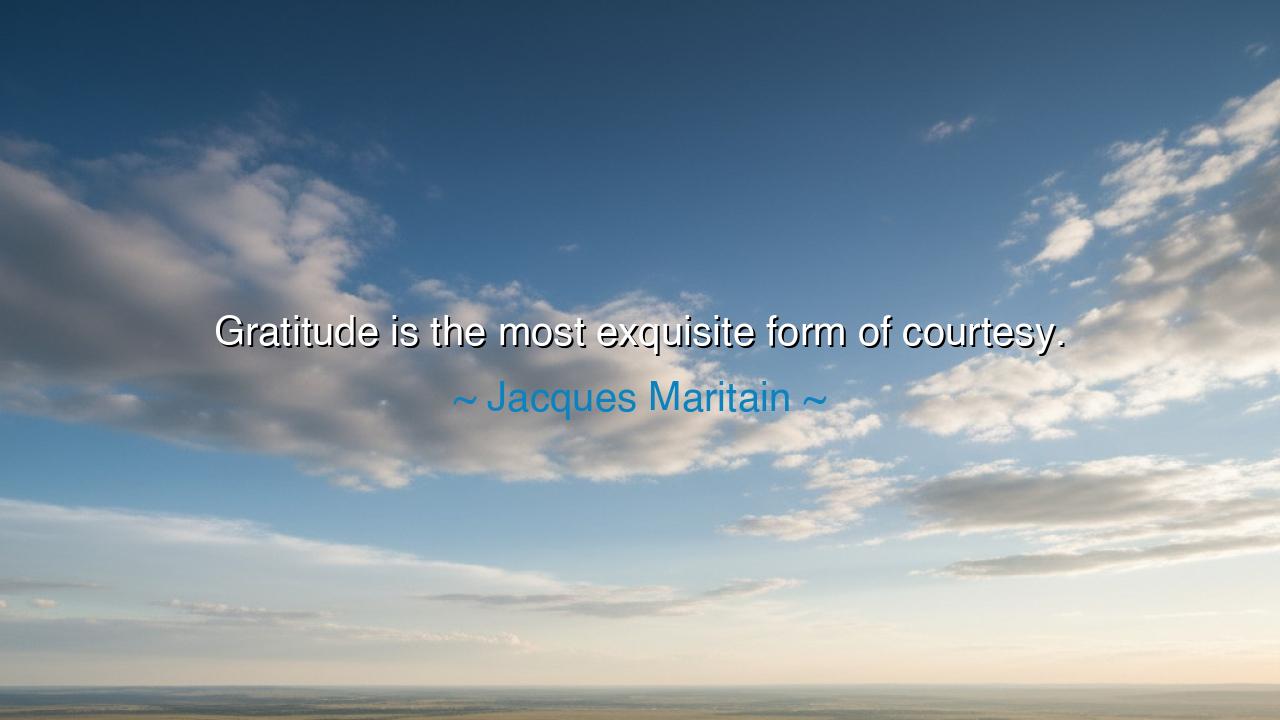
Gratitude is the most exquisite form of courtesy.






Jacques Maritain, the philosopher who sought to bind heaven and earth through truth, once declared: “Gratitude is the most exquisite form of courtesy.” In this phrase lies the refinement of both manners and morals. Courtesy without gratitude is but a hollow gesture, an empty ritual of politeness. But when the heart is moved with genuine thankfulness, every word, every gesture becomes radiant with sincerity. Thus Maritain teaches us that the highest courtesy is not the bow, the phrase, or the formal act, but the soul’s true acknowledgment of the gift received.
To call gratitude the “most exquisite” courtesy is to rank it above all other social graces. A man may speak eloquently, dress finely, or display flawless etiquette, but if his heart is ungrateful, his politeness is only a mask. Yet even the simplest person, with plain speech and humble means, can show an elegance greater than kings by offering genuine thanks. Gratitude refines the spirit, polishes the roughness of pride, and clothes the soul in beauty that no gold or ornament can surpass.
The ancients bore witness to this truth. Cicero, the Roman orator, said, “Gratitude is not only the greatest of virtues, but the parent of all the others.” For without gratitude, justice becomes cold duty, courage turns into arrogance, and wisdom into pride. But gratitude tempers all things with humility and grace. Courtesy, when joined with thankfulness, ceases to be mere custom and becomes an offering of the heart. Maritain, centuries later, simply distilled this ancient wisdom into his phrase, reminding a forgetful world that true refinement comes not from wealth or station, but from gratitude.
History gives us shining examples. Consider Abraham Lincoln. In the midst of civil war, with a nation bleeding and divided, he proclaimed a national day of thanksgiving, not merely as political ceremony, but as a profound act of courtesy to Providence and to the countless unseen hands who labored for peace. His gratitude did not weaken his authority but ennobled it, softening the iron of war with the grace of humility. He showed that even in times of conflict, leaders could practice the most exquisite courtesy: sincere gratitude to God and to people.
By contrast, the absence of gratitude breeds coldness and decay. Monarchs who demanded loyalty but never offered thanks to their subjects often found their thrones unstable. Generals who received victory but failed to honor their soldiers were abandoned in times of need. The proud who consume gifts without gratitude are despised, for their courtesy is empty and their souls are barren. Gratitude alone binds giver and receiver in a bond of dignity and mutual respect.
The lesson, then, is clear: let all courtesy be clothed in gratitude. Do not let politeness be a mask for indifference, but let it be a window through which true thankfulness shines. When someone serves you, do not offer only the words “thank you,” but offer them with heart, with warmth, with sincerity. When life itself grants you blessings—breath, food, friendship—lift your soul in gratitude to the Giver of all. Such gratitude is not only virtue but beauty, the crown of all human interactions.
Practically, we may train our souls in this art of exquisite courtesy. Begin by slowing down in your thanks: look into the eyes of those you thank, speak as though your gratitude is weighty and real. Write letters of thanks, not only when custom demands it, but when the heart moves you. Keep a journal of blessings, so that gratitude may become habit, not accident. In doing so, your life will radiate refinement far beyond outward manners, for it will shine with the splendor of a grateful heart.
Thus, Maritain’s words endure as a torch for the generations: gratitude is not ornament but essence, not mere courtesy but the most exquisite form of it. Cultivate this virtue, and you will walk through the world with a grace that cannot be feigned, a beauty that cannot be stolen, and a nobility that outlives the fleeting fashions of men. For the soul that is grateful is the soul that is truly refined.






AAdministratorAdministrator
Welcome, honored guests. Please leave a comment, we will respond soon